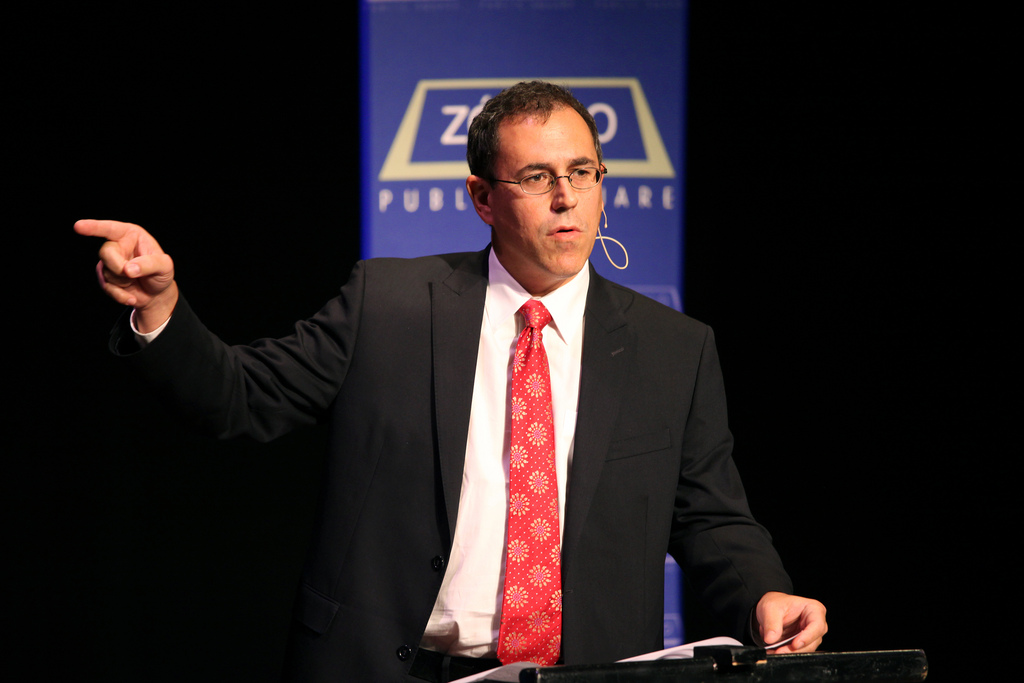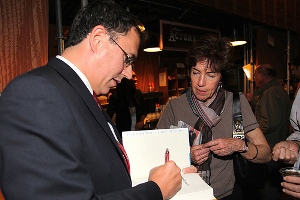
For those Tea Partiers who claim that their Revolutionary-era forbears were against taxation, Barry C. Lynn had another idea.
“The real story of the first Tea Party was about people rising up against monopoly,” said Lynn, a New America Foundation fellow and author of Cornered: The New Monopoly Capitalism and the Economics of Destruction. “American was born out of many rebellions against monopolies.”
The early republic, Lynn noted, rejected monopolies of church, land, and commerce. For two centuries the country fought and established laws against monopolies, preventing private government and the concentration of economic and political power.
But as Lynn explained to the crowd at The Actors’ Gang in Culver City, in the last three decades, antimonopoly laws have been rolled back to such an extent that most every industry is dominated by one or a few companies – leaving their employees, their consumers, and their producers with little freedom and a lot of fear.
Shopkeeps then and now
 Lynn clarified a few other misconceptions about our country’s founders. “When the founders spoke of free trade,” he said, “they didn’t mean there would be no rules over trade.” Instead, the founders intended to protect Americans from the trading systems of foreign powers – any corporation or country trying to take over some aspect of commerce in the U.S. “The idea of the founders was that every citizen, or as many as possible, would have property and the liberty to work that property and to take that work to the open markets,” he said. Thomas Jefferson and James Madison may have been dismissed as naïve by their federalist rivals, who said such a society would hinder the specialization of labor. “In truth their vision was actually extremely sophisticated,” Lynn said. The farmers, shopkeeps and producers then – or the entrepreneurs, small businessmen, and innovators of today – were meant as a “bulwark against all those lords.” They were the foundation of a democratic republic, rather than an aristocratic republic.
Lynn clarified a few other misconceptions about our country’s founders. “When the founders spoke of free trade,” he said, “they didn’t mean there would be no rules over trade.” Instead, the founders intended to protect Americans from the trading systems of foreign powers – any corporation or country trying to take over some aspect of commerce in the U.S. “The idea of the founders was that every citizen, or as many as possible, would have property and the liberty to work that property and to take that work to the open markets,” he said. Thomas Jefferson and James Madison may have been dismissed as naïve by their federalist rivals, who said such a society would hinder the specialization of labor. “In truth their vision was actually extremely sophisticated,” Lynn said. The farmers, shopkeeps and producers then – or the entrepreneurs, small businessmen, and innovators of today – were meant as a “bulwark against all those lords.” They were the foundation of a democratic republic, rather than an aristocratic republic.
Books, beer, boots
Beginning with the Reagan administration and continuing in the Clinton administration, Lynn said, our antimonopoly laws have been overthrown, and the effect is apparent in every industry. In the publishing world, Lynn noted, massive companies like Wal-Mart and Amazon use books as loss leaders to bring customers in to buy pricier items – meaning that books are priced artificially low. The companies are powerful enough to dictate prices to the producers, including publishers, writers, and the people who make the physical books. Any publisher who tries to fight, as Macmillan did, Lynn noted, can be shut out. “For much of our history, this kind of price manipulation by a very powerful conglomerate was illegal,” he said in Q&A.
The same consolidation is happening in the world of beer, Lynn said. While the number of breweries in the country has skyrocketed in the last 30 years, the power has grown increasingly concentrated. In 1978, the largest brewery controlled 25 percent of the market; today, the top two have about 90 percent, and the power in many cases, Lynn said, to determine the terms of sales for all the rest. And cowboy boots – all three of the most popular brands – are owned by Warren Buffett. “The capitalist gets to charge the cowboy, the rancher, just to stand in his own boots,” Lynn said.
Farmers and Don Drapers
 Farmers face the same fear, whether they deal in poultry, dairy, seed or beef. “If you grow chickens there is no open market for you to bring your chickens,” Lynn said. “You grow for Tyson or Purdue. You take their chicks, their feed, their drugs, on terms they dictate, then you take their prices. There’s no negotiation.” Four thousand dairies in Wisconsin alone went bankrupt this year; another farmer shot his cows and himself, Lynn noted.
Farmers face the same fear, whether they deal in poultry, dairy, seed or beef. “If you grow chickens there is no open market for you to bring your chickens,” Lynn said. “You grow for Tyson or Purdue. You take their chicks, their feed, their drugs, on terms they dictate, then you take their prices. There’s no negotiation.” Four thousand dairies in Wisconsin alone went bankrupt this year; another farmer shot his cows and himself, Lynn noted.
White-collar workers aren’t immune, Lynn said, citing the show “Mad Men” as depicting the way things were. “You see how the place used to be when there were lots of different agencies – there was all this churning, this energy, the freedom to move around,” he said. Now, instead of 20 or 30 large agencies, three holding companies control almost all of them. “If you want to change your job, you want more money, you want to stand up to your boss, there’s a lot less chance you’re going to do that,” he said. The medical, accounting, law, and technology industries have seen similar consolidation. The Department of Justice even investigated a recent agreement between tech companies to agree not to hire each others’ workers. “These companies ain’t rich enough? I guess not, they’ve created buyers’ cartels,” Lynn said.
The consumer isn’t king
The international market system created after World War II initially benefited Americans and the world, Lynn noted. But since the Clinton era, free traders “sold the keys to this empire,” Lynn said, to the likes of “the British East India Companies of today, like Wal-Mart.” Today, Americans rely primarily on China for their goods – semiconductors, light bulbs, batteries, food additives. The Chinese company that controls much of our vitamin C raised by prices by 400 percent once they achieved monopolistic control. “Think about what China could do tomorrow if they closed the border,” Lynn said.
Meanwhile, monopolies don’t seem to be doing better by consumers. Choice has been replaced by “an illusion of choice,” Lynn said. Quality and safety of many products is down; our health is getting worse; job creation and innovation are down but prices are up.
In fact, simply considering ourselves consumers may be the problem, Lynn noted. Instead of referring to ourselves as citizens, Lynn argued, “we allowed ourselves to be relabeled consumers. What do consumers value in this country? They don’t value liberty. They value stuff.”
They also seem to value what’s called “efficiency.” “The old tiny monopolists of the 19th century – John D. Rockefeller, J.P. Morgan – routinely used the word efficiency to justify the accumulation of power,” Lynn said. The logic of monopoly argues that competition is wasteful. “It’s the same argument as Marxists, Leninists, Stalinists make,” he said.
The Second American Revolution, and the Third?
Lynn still sees a way to fix the system even if he admits, “It ain’t going to be easy.” Neither party seems so motivated – Democrats and Republicans “like to have the power…the only time they really argue is about who should be in charge,” he said. And the Obama administration is in some cases accelerating conglomeration – in insurance and banking.
 But Lynn noted that Americans have pulled it off before – after the Civil War, when Rockefeller and Andrew Carnegie arose as the “second generation of feudal lords, not of land but of industrial estates,” Americans beat them back. In the 1930s, the Second New Deal rejected private centralization and private socialization of risk and private rule, Lynn said. “If ever we are going to reestablish the democratic republic, we must recognize the Second New Deal for what it was – a Second American Revolution,” he said. “All we have to do is look at our own hands, and there’s the power.”
But Lynn noted that Americans have pulled it off before – after the Civil War, when Rockefeller and Andrew Carnegie arose as the “second generation of feudal lords, not of land but of industrial estates,” Americans beat them back. In the 1930s, the Second New Deal rejected private centralization and private socialization of risk and private rule, Lynn said. “If ever we are going to reestablish the democratic republic, we must recognize the Second New Deal for what it was – a Second American Revolution,” he said. “All we have to do is look at our own hands, and there’s the power.”
When pressed about the possibility of an American populist movement during Q&A, Lynn noted that America did have such a party at the turn of the last century, built after the Civil War, bent on exposing that the concentration of power wasn’t natural. “It’s not metaphysical that certain people get rich, certain people don’t,” Lynn said. “You pull back the curtain, and there’s all these levers, and a little guy manipulating the levers.”
And as for today’s would-be populists, he said, the Tea Party ranks include “a bunch of really good well-meaning folks.” But “they don’t have an intelligentsia built in. They’re being fed lines… they’re a captive army used by the very people they set out to fight.”
Watch the video here.
See more photos here.
Read Barry Lynn’s In The Green Room Q&A here.
Read an excerpt of the book here.
Buy the book here.
*Photos by Aaron Salcido.




Send A Letter To the Editors